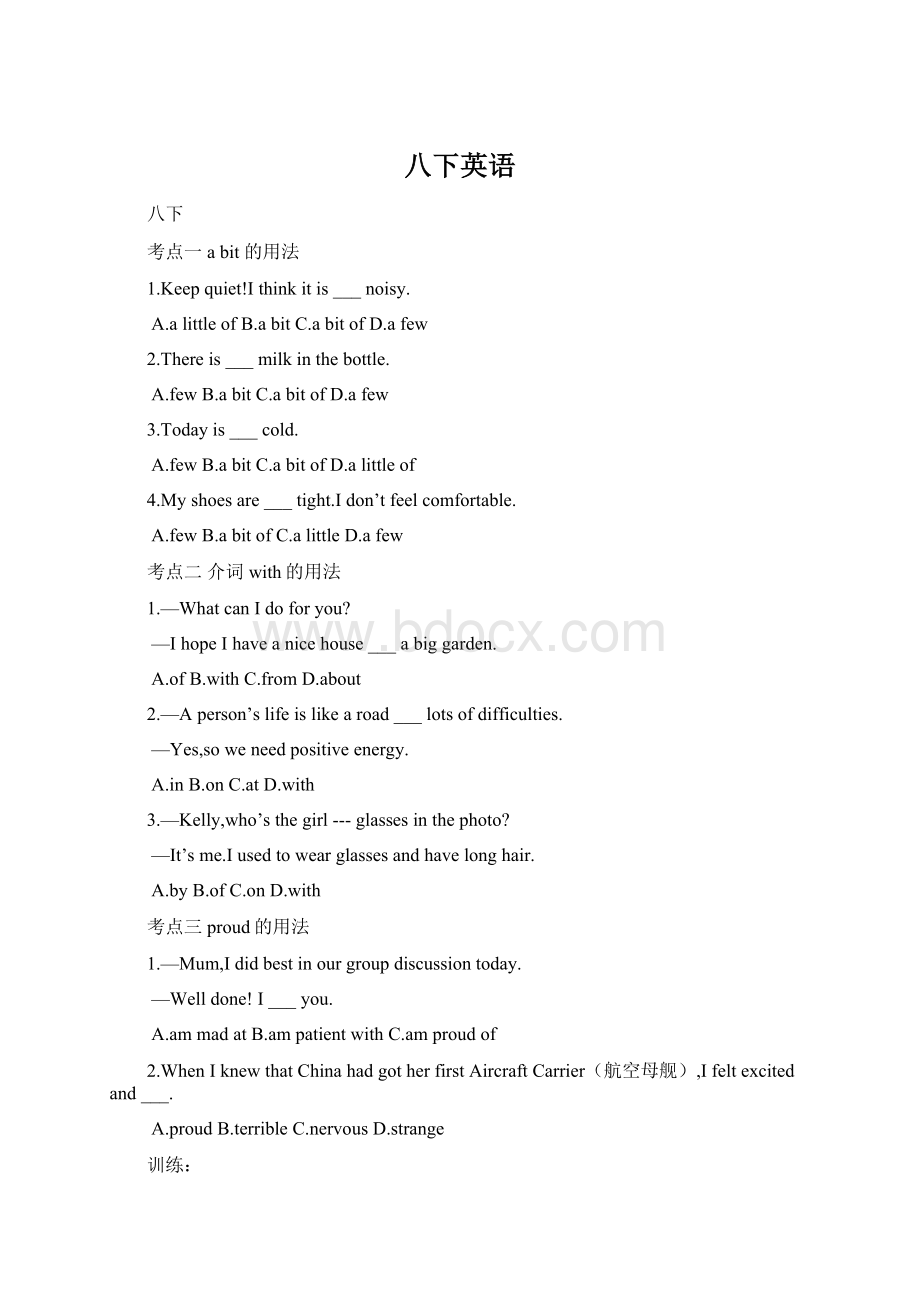八下英语.docx
《八下英语.docx》由会员分享,可在线阅读,更多相关《八下英语.docx(16页珍藏版)》请在冰豆网上搜索。

八下英语
八下
考点一abit的用法
1.Keepquiet!
Ithinkitis___noisy.
A.alittleofB.abitC.abitofD.afew
2.Thereis___milkinthebottle.
A.fewB.abitC.abitofD.afew
3.Todayis___cold.
A.fewB.abitC.abitofD.alittleof
4.Myshoesare___tight.Idon’tfeelcomfortable.
A.fewB.abitofC.alittleD.afew
考点二介词with的用法
1.—WhatcanIdoforyou?
—IhopeIhaveanicehouse___abiggarden.
A.ofB.withC.fromD.about
2.—Aperson’slifeislikearoad___lotsofdifficulties.
—Yes,soweneedpositiveenergy.
A.inB.onC.atD.with
3.—Kelly,who’sthegirl---glassesinthephoto?
—It’sme.Iusedtowearglassesandhavelonghair.
A.byB.ofC.onD.with
考点三proud的用法
1.—Mum,Ididbestinourgroupdiscussiontoday.
—Welldone!
I___you.
A.ammadatB.ampatientwithC.amproudof
2.WhenIknewthatChinahadgotherfirstAircraftCarrier(航空母舰),Ifeltexcitedand___.
A.proudB.terribleC.nervousD.strange
训练:
1.Thetrousersare___tight.
A.bitB.littleC.abitD.afew
2.—MoreandmorepeoplecometovisitMountHuangshan.
—That’strue.Ithasbecomethe___ofAnhui.
A.prideB.effortC.praiseD.courage
3.Shewasproud___herdaughterwhohadsomuchtalent.
A.ofB.inC.byD.with
4.Yousee,Keviniswriting___hislefthand.
A.atB.asC.forD.with
5.—Excuseme,wouldyoupleasespeakalittlemore___?
—Sorry,Ithoughtyoucouldfollowme.
A.sadlyB.quicklyC.politelyD.slowly
语法一:
现在完成时
1.含义:
表示过去发生或已经完成的动作对现在造成的影响或结果。
提示词:
already,yet,never,before,just,recently,sofar,manytimes
2.基本结构:
助动词have/has+动词的过去分词(done)
3.句式变化:
肯定句:
主语+have/has+动词的过去分词.
否定句:
主语+have/has+not++动词的过去分词.
一般疑问句:
Have/Has+主语+动词的过去分词+其他?
回答:
Yes,主语+have/has.
No,主语+haven’t/hasn’t.
1.He___inthisfactoryfor20yearsalready.
A.willworkB.worksC.hasworkedD.isworking
2.The2014WorldCupinBrazilmakesthewholeworldcrazyandnobodywillmissit.I___allthematchessofar.
A.watchedB.havewatchedC.willwatch
3.Ourteachersareveryfriendlytous.We___friendssincethreeyearsago.
A.havebeenB.havebecomeC.wouldbe
4.—Areyousurprisedattheendingofthemovie?
—No,becauseI___thestory.
A.readB.willreadC.havereadD.wasreading
5.—IsMrGreeninthisoffice?
—No,she___tothelibrary.
A.goesB.hadgoneC.hasgoneD.wouldgo
训练:
1.—Whatdoesyourfriendslooklike?
—___.
A.Sheisthin.B.Sheisakindgirl.C.Shelikesmusic.D.Sheisfriendly.
2.—Whydon’tyougotoseethemovieswithme,Betty?
—BecauseI___itbefore.
A.sawB.haveseenC.seeD.hasseen
3.Themandownstairsfound___difficulttosleep.
A.thatB.itsC.itD.this
4.—Whydidthepolicestopus?
—Heaskednot___sofastinthisstreet.
A.driveB.drivingC.todriveD.drove
考点三enough的用法
1.Thedininghallis___tohold300people.
A.enoughbigB.enoughsmallC.smallenoughD.bigsmall
2.—Mum,IthinkI’m___togetbacktoschool.
—Notreally,mydear.You’dbetterstayathomeforanotherdayortwo.
A.sowellB.sogoodC.wellenoughD.goodenough
3.IfIhad___,I’dvisitallthesmallinterestingplaces.
A.alongenoughholidayB.anenoughlongholidayC.aholidayenoughlong
D.alongholidayenough
考点四havebeento与havegoneto的用法
1.Anumberoftourists___Yangzhoumanytimesbecauseitissuchabeautifulcity.
A.havebeentoB.hasbeentoC.hasgonetoD.havegoneto
2.LucyandLilycanspeakgoodChinese,becausethey___Chinaforsixyears.
A.havebeentoB.havebeeninC.havecometoD.havegoneto
3.—WhereisDaming?
—He___theteacher’soffice.He’llbebacksoon.
A.hasbeentoB.hasgonetoC.willgotoD.isgoingto
4.—LiuMing,isthatourheadteacherMissChenoverthere?
—Itcan’tbeher.She___Xiamenforameeting.
A.hasbeentoB.hasgonetoC.hasbeenaway
考点五toomuch和muchtoo的用法
1.—Themeatis___delicious.
—Yes,butdon’teat___.
A.toomuch;toomuchB.muchtoo;toomuchC.toomuch;muchtooD.muchtoo;muchtoo
2.___treesarestillbeingcutdownsomewhereintheworld.
A.MuchtoB.ToomuchC.ManytooD.Toomany
3.Look!
There’s___iceonthelake.
A.toomuchB.muchtooC.alotD.toomany
4.Thesweaterisverybeautiful,butit’s___expensive.
A.toomuchB.muchtooC.manyD.more
训练:
1.Thismoviewasn’t___.Hefellasleephalfwaythroughit.
A.interestingenoughB.enoughinterestingC.interestedenoughD.enoughinterested
2.Rideslowly,please.Thereis___trafficatthistimeoftheday.
A.muchtooB.toomuchC.toomanyD.manytoo
3.Iwas___tobeintherightplaceattherighttime,soIsavedherintime.
A.enoughluckilyB.luckilyenoughC.enoughluckyD.luckyenough
4.—Let’sgotoseethelionsfirst?
—Oh,no!
Ithinktheyare___uglyandscary.
A.toomanyB.toomuchC.muchtooD.kindof
5.Mr.Wangisn’there.Ithinkhe___Shanghai.
A.wentB.hasbeentoC.hasgoneto
语法二延续性动词与非延续性动词
1.延续性动词表示能够延续的动作,如learn,work,stand,lie,know,keep,have,wait,sing,read,sleep,live,stay等。
延续性动词可与表示时间段的状语连用。
表示时间段的短语有:
①for+一段时间:
fortwoyears;②since从句:
sincehecamehere;
③since+时间点名词:
sincelastyear;since5daysago;④howlong⑤foralongtime
2.非延续性动词也称终止性动词,这种动作发生后立即结束,如:
open,die,close,begin,finish,come,go,move,borrow,lend,buy等。
非延续性动词在肯定句中与表示时间点的状语连用,如:
twoyearsago,at5o’clock
3.延续性动词与非延续性动词的转换:
die-bedead,borrow-keep,begin/start-beon,leave-beaway,buy-have,open-beopen,
getto/arrive/reach-be(in),puton-wear,join-bein/beamemberof,comehere-behere,
finish-beover,opensth.-keepsth.open,fallill-beill,comeback-beback,fallasleep-beasleep,
leave-beawayfrom,gettoknow-know
训练:
1.—Iwonderwhenyou___thenewwatch.
—Well,I___itfortwoyears.
A.havebought;havehad
B.bought;havebought
C.bought;havehad
D.havebought;havebought
2.TheWeifang-Hainanairline___forabout5months.Ihavetakentheflightsthreetimes.
A.isopenB.hasopenedC.hasbeenopenD.hasbeenopened
3.Whenhearrivedatthebusstop,thebus___for20minutes.
A.hasleftB.hadleftC.hasbeenawayD.hadbeenaway
4.I’lllendyouthebook,butyoucanonly___itfor2days.
A.borrowB.keepC.takeD.taken
5.Hepromisedtopickmeupattheschoolgate.However,he___yet.
A.didn’tarriveB.doesn’tarriveC.isn’tarrivingD.hasn’tarrived
6.Mostyoungpeoplefind__excitingtowatchafootballmatch.
A.itB.thisC.thatD.one
7.—WhenwillDianaarrive?
—Oh,she___.Sheisinthemeetingroomrightmow.
A.arrivesB.isarrivingC.arrivedD.hasarrived
8.Hehasstudiedhere___hecamehere.
A.sinceB.forC.atD.in
9.Lucyisn’toldenoughtocarrythebox.
A.issoyoungthatshecan
B.isn’tyoungenoughto
C.istooyoungto
D.issoyoungto
考点六It’stime---的用法
1.It’stime___theweatherreport.Turnontheradio,please.
A.toB.inC.atD.for
2.It’stime___tosleep,Tom.
A.goB.togoC.goingD.togoing
考点七show的用法
1.—Doyouknowthewaytothepostoffice?
—Yes.FollowmeandI’ll___you.
A.callB.showC.pickD.invite
2.Ienjoythe___verymuch.
A.showsB.showC.showingD.toshow
3.Showmeyournewdress___me.
A.forB.onC.inD.to
4.Weallknowhowwonderfulyouare.Thereisnoneedto___.
A.showoffB.giveupC.takecareD.carryon
考点八comeout的用法
1.Thegreatwriterhaswrittenmanystoriesforchildren.It’ssaidthatanewonewill___attheendofthismonth.
A.gooutB.comeoutC.lookoutD.runout
2.—Willhisnewnovel___inSeptemberthisyear?
A.comeoverB.comebackC.comeoutD.comefrom
3.—Ilikethemagazine.Whenwillthenextone___?
—NextMonday.
A.comeonB.gooutC.lookoutD.comeout
4.Thebookwon’t___untiltheendoftheyear.
A.comeoutB.comeoverC.cometrueD.comeon
训练:
1.It’ssixo’clock.It’stime___up.
A.togetB.gettingC.gettoD.forget
2.”LearningFromLeiFengDay”isonlytwoweeksfromnow.Weneedto___aplanaboutit.
A.comeupwithB.putupC.callupD.setup
3.___thepicturestoallthestudents.
A.LookB.ShowC.SeeD.Let
4.Hisnewbookwill___sometimenextmonth.
A.comeoutB.comeupC.comeonD.comewith
5.—Who’sthemostmodestboyinyourclass?
—Daniel.Henever____inpublic.
A.getsoffB.takesoffC.showsoffD.turnsoff
语法二一般现在时、一般过去时和过去完成时的区别
1.一般现在时:
表示经常性或习惯性的动作。
时间状语主要有:
always,usually,often,sometimes,never,everyday,onSundays,
inthemorning/afternoon/evening
Ileavehomeforschoolat7:
00everymorning.
Myparentsgivemetenyuaneveryweek.
2.一般过去时:
表示过去某个时间发生的动作或存在的状态。
时间状语:
yesterday,lastweek,twoyeasago,justnow,in2002
Iwenttoschoolat7:
00yesterdaymorning.
Myparentsgavemetenyuanlastweek.
3.现在完成时:
强调过去发生的动作对现在产生的影响或结果。
时间状语:
just,already,ever,never,before,since---,for+一段时间
Amyhasalreadylefthome,Ihavetogotoschoolmyself.
Myparentshavegivenmetenyuanthisweek.Ican’thavemore.
训练:
1.Myhusbandalways___meflowerseveryweekbeforewegotmarried,butnowhenever___.
A.sends;doesB.sent;doesC.wasgoingtosend;doD.sent;do
2.—ThepapersaysIronMan3isonthisevening.Let’sgoandseeit.
—ButI___it.
A.seeB.sawC.haveseenD.willsee
3.Jackson___schooltwoyearsagoandhe___fortwotears.
A.leaves;hasgoneB.left;hasbeenawayC.leaves;hasbeenawayD.left;hasgone
4.—WhatdoesTom’suncledo?
—Heisateacher.He__physicsataschoolnow.
A.willreachB.hastaughtC.teachesD.taught
5.Lucy___astudentlastyear,butnowshe___ateacher.
A.is;isB.was;isC.was;willbeD.is;was
6.Isawhiminthelibraryyesterday.He___abookatthatmoment.
A.readsB.isreadingC.wasreadingD.willread
7.Canyouhelpher?
She’s___deeptrouble.
A.inB.onC.atD.with
8.Thedoctorkepttheman___becauseofhisillness.
A.tosmokeB.smokingC.fromsmokingD.smoke
9.Myparents___Tianjinfor50years.
A.havebeeninB.havebeentoC.havegonetoD.havebeen
10.—IsthatChrisspeaking?
—Sorry,heisn;tin.He___abroad